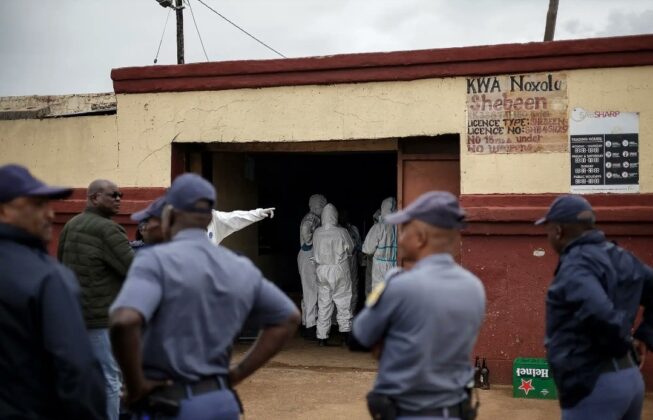
Rachel Reeves denies IMF bailout warnings, says UK economy still on track. Image: The Guardian.
(The Post News)– Chancellor Rachel Reeves has rebuked growing speculation that an International Monetary Fund (IMF) bailout could be looming for Britain, likening such suggestions to “irresponsible” scaremongering. She maintained that the UK’s economy remains on course when asked, despite rising lending costs and growing pressure to raise taxes.
In an exclusive interview with the BBC, Reeves said, “A lot of them are talking rubbish. Frankly, what they’re saying is irresponsible.” The remarks came after starkly different economists and think tanks issued dire warnings, some comparing the financial outlook to the conditions that preceded the UK’s 1976 IMF bailout. Reeves roundly dismissed the parallels.
Economists Warn of £50 Billion Fiscal Hole
The National Institute of Economic and Social Research (NIESR) recently forecasted an estimated £50 billion shortfall in the public finances. Director David Aikman stated Reeves has an “impossible trilemma” that includes honoring the fiscal rules, following through on the spending plans, and not imposing the high-end levies on working people.
Reeves dismissed the forecast, stating NIESR “more than most got their numbers wrong in recent years,” even when the institute applied the identical fiscal model to the IMF.
Further estimates, including Treasury forecasts issued inside the department, estimate the possibility of being £25–£30 billion short on money if growth slows down and lending rates keep climbing.
Government lending rates skyrocketed this week to unforeseen heights not seen since the closing days of the 1990s. This escalation puts additional stress on Reeves ahead of the drawing up of her initial full budget on November 26.
In spite of these statistics, the Chancellor maintained that no country is safe. “Global borrowing costs are rising,” Reeves said. “From the United States to Europe, no country is safe.”
Shadow Chancellor Mel Stride did not believe so. Reeves was accused by Stride of “stalling” the budget, as he claimed she doesn’t have an idea how to counter the UK’s slipping fiscal situation, with the Parliament due for its conclusion by June next year.
Reeves Sticks to Fiscal Rules
The Chancellor insists on her two most vital rules: Fund all spending on day-to-day government spending through the money raised by levying taxes by 2029–30, as well as ensure the country’s debt diminishes as a proportion of GDP by the conclusion of the Parliament.
Reeves also broke her silence on media reports where she will unveil new levies on property and bankers, as well as high-enders. “People speculating on what’s in the budget prior to making choices are completely wrong,” she said. “It’s my responsibility to choose what goes in the budget, and I’ll make that decision responsibly.”
She reiterated her aim is to balance public services such as the NHS with conditions for long-term growth and investment.
Labor Under Pressure
Labour’s internal divisions are growing. TUC (Trades Union Congress) is pressing Reeves to look at wealth taxes such as capital gains reform and bank profits levies to fund public services and narrow the gap between the rich and poor.
TUC General Secretary Paul Nowak said the following to the BBC: “The government shouldn’t rule anything out. We need a progressive tax regime where people with the widest shoulders pay their due.”
But business leaders also countered. Lloyds Bank Chief Executive Charlie Nunn expressed concern that additional taxes on bankers would deter the sector. Shares fell after similar suggestions by the IPPR think tank. Reform UK Deputy Leader Richard Tice also commented, saying Reeves would “automatically raise taxes on working people,” even though the issue is contrary to Labour’s election promises.
The UK is not alone in criticism over the country’s debt situation and fiscal soundness. This week, France’s Economy Minister Eric Lombard said France could soon face IMF bailout risks with rising costs for borrowing money. Having generated over €3.3 trillion in national debt, Lombard said French debt would suddenly overtake Italian costs.
Ex-NIESR boss Prof. Jagjit Chadha also sounded the alarm, saying the UK risks becoming “as dangerous as the chapter on the IMF loan of 1976.” Reeves also confirmed the first major autumn budget will happen on November 26 as the Office for Budget Responsibility (OBR) examines Britain’s long-term growth prospects.
If the OBR doesn’t approve Reeves’ planned reforms on construction plans through the White Paper as well as US-India-EU trade deals, there may need to be rises in taxes to achieve her fiscal targets.
Reeves, however, has faith. “I know how crucial it is to achieve growth and investment. I’ll do that within the budget this year,” she said. With high borrowing costs, political pressure, and economic uncertainty, Rachel Reeves faces a high-stakes moment. Her credibility and Labour’s fiscal reputation will be tested in the months leading to November. As unions, businesses, and voters wait for answers, Reeves is betting that growth, not bailouts, will define Britain’s future.



